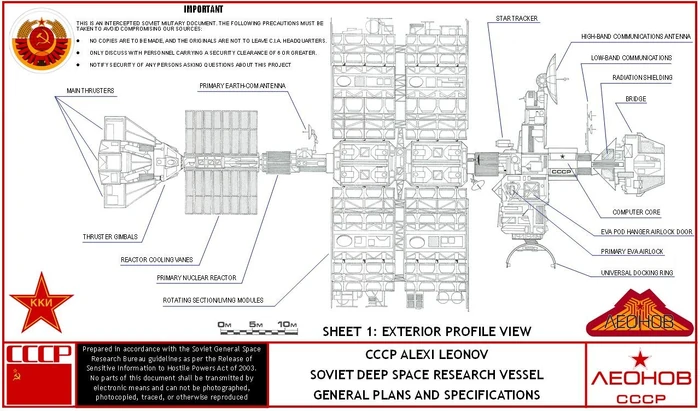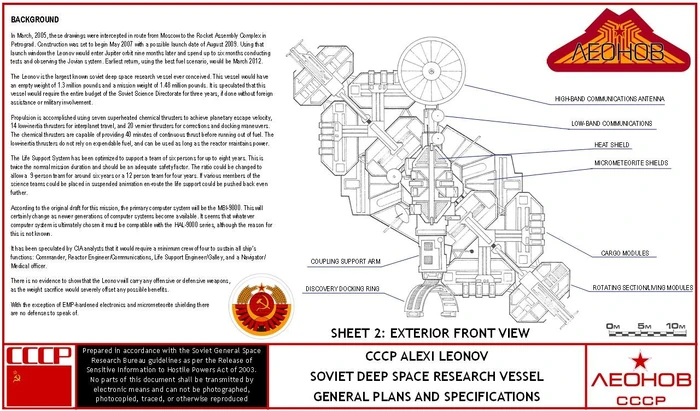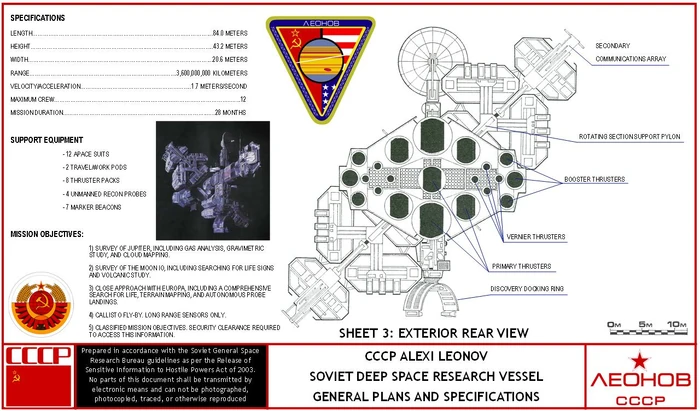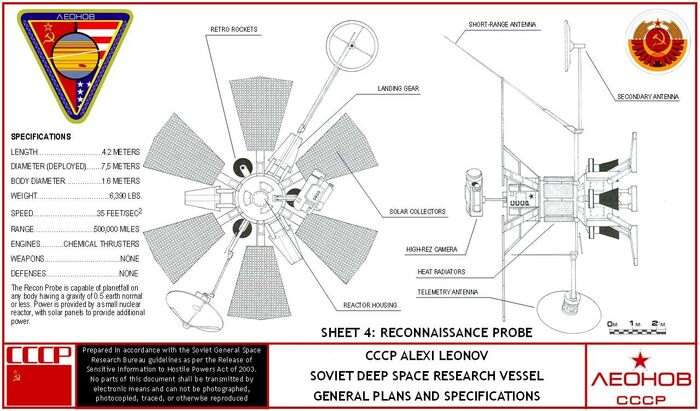The Leonov, its namesake being Cosmonaut Alexei Leonov, is a fictitious Russian spacecraft that was used on the Jupiter Mission,[c 3] in Arthur C. Clarke’s 2010: Odyssey Two and 1984 film adaption.
Namesake
The Cosmonaut Alexei Leonov was named after Soviet cosmonaut
Alexei Leonov, the first person to walk in space. There is a framed painting by Leonov inside the spacecraft. The Americans were led to believe that it would be called Gherman Titov, but the name changed[c 4] to Alexei Leonov in January 2006.[c 5]
Jupiter Mission

The Leonov was a Russian-built spacecraft, with a rotating segment, used for the joint Russian/American Jupiter Mission to the Jovian system. The purpose of the mission was to recover the American Discovery spacecraft and if possible set its course back to Earth; as well as locate and investigate the “alien artifact”.[c 6] The Russian crew referred to it as zagadka (Russian for 'enigma').
Jupiter entry
The Leonov was equipped with a "Sakharov Drive", a propulsion system that employed a pulsed thermonuclear reaction to heat while expelling propellant material. The Leonov slowed into the Jovian orbit by performing an aerobraking maneuver. To prevent the spacecraft from burning up in Jupiter's thick atmosphere, Leonov deployed an inflatable low-density heat shield, which was discarded shortly after aerobraking. The aerobraking procedure put Leonov into the Lagrange point between Io and Jupiter, the location of both the monolith and Discovery.
Escape from Lucifer
One night while Dr. Floyd was on night watch, he was surprised to see the spectral form of the presumed dead David Bowman, who proceeded to give Floyd instructions to leave Jupiter within just 15 days (2 in the film). Floyd argued that they hadn't sufficient propellant to make such a hasty departure from Jupiter. Nevertheless, Bowman insisted that they leave within 15 days. When Floyd asked why, Bowman simply said that something was going to happen; "something wonderful".
Because of this, Floyd insisted to the crew that they leave before this mysterious deadline. Naturally, they disagreed, as they had no real reason to leave upon such short notice.
Under mysterious circumstances, quite to the bewilderment of the crew of Leonov, the monolith simply disappeared. Also, shortly after this, a strange black circle appeared near the equator of Jupiter.
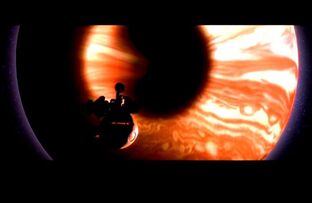
Walter Curnow, one of the three American crew, suggested linking Leonov to Discovery, using Discovery as a booster rocket, giving Leonov the proper escape velocity. After the burn was complete, Discovery would simply be cast off. This plan would enable Leonov to leave within the 15 days.
And so, with some effort, Leonov was coupled to Discovery.
The crew of Leonov had observed that the strange black spot had become substantially larger. Under high magnification it soon became apparent that the spot was not solid, but it was indeed a conglomeration of innumerable objects, identified to be exactly the same as the Jupiter monolith. Also, they were reproducing at an alarming rate. Pretty soon, the circle of monoliths had nearly eclipsed the whole of Jupiter.
As Leonov was departing from Jupiter, the planet suddenly exploded, filling the sky with bright light. As the light slowly faded, it became apparent what the monoliths were doing. They had been sucking up the gasses in Jupiter's atmosphere, making them more dense, therefore making nuclear fusion possible at the heart of Jupiter, turning the planet into a mini-sun, eventually named Lucifer.
After Discovery was cast off from Leonov, Dave Bowman appeared to Hal, telling him to send one last message to the Earth, and to repeat it as many times as possible. The message was "ALL THESE WORLDS ARE YOURS — EXCEPT EUROPA, ATTEMPT NO LANDINGS THERE". Discovery was destroyed during the formation of Lucifer.
Spec sheets
Designs by Lawrence Miller.
Gallery
Trivia
- The basic design of the Leonov, including its large rotating section, was later used as the Omega-class destroyer in the science fiction TV series Babylon 5.
Fanon
Canon
- ↑ 2010 Screenplay, p. 23
- ↑ 2010 screenplay, p. 23 (Read it).
- ↑ Arthur C. Clarke’s 2010: Odyssey Two, p. 2 (Read it!)
- ↑ 2010 screenplay, p. 7 (Read it).
- ↑ Arthur C. Clarke’s 2010: Odyssey Two, p. 1 (Read it!)
- ↑ Arthur C. Clarke’s 2010: Odyssey Two, p. 4 (Read it!)

